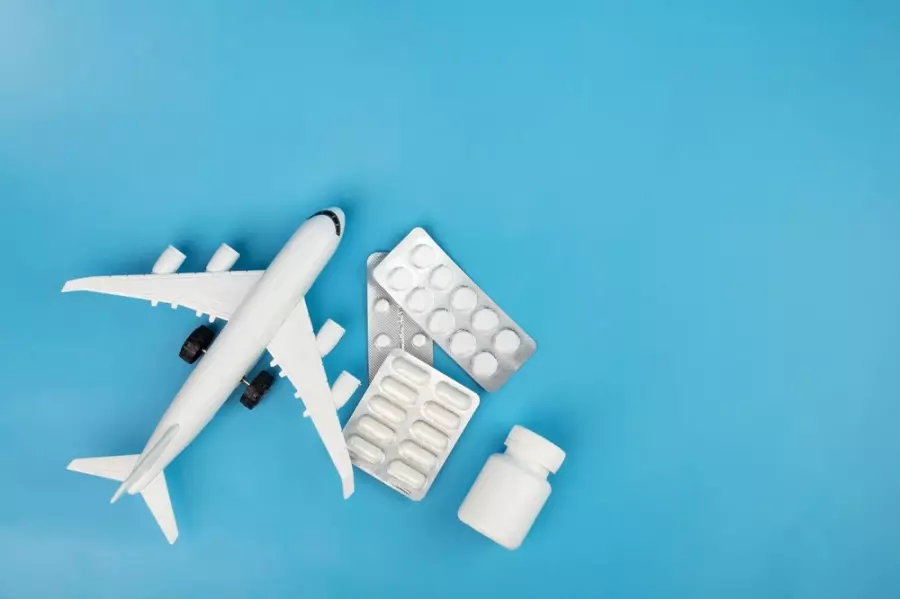Change language
Rules and recommendations for the transport of pills during air travel
August 21, 2024

Many pills and medicines require a prescription, which means you have to buy them domestically. But how do you transport the pills on board the aircraft? What medicines are you allowed to take on the plane? What are the prohibited ones? AirClaim specialists will answer these questions below.
Can you take medicine with you on the plane?
Yes, you can take medicine with you on the plane! According to European law, you have the right to bring medicines and pills on board the aircraft. For example, if you fly with medication on a Wizz Air plane, you just have to make sure you have the prescription with you at the time of the security check. This is a precaution taken to prevent substance abuse and to ensure that medications are administered correctly.
Also, remember that you can carry medication for the duration of your trip. If you're going on vacation for 7 or 30 days, you should have medication with you for the entire duration.
To make your planning easier, here are some step-by-step instructions:
- Check if your medications require a prescription.
- Make sure you have your prescription with you at the time of the security check.
- Package the medicines in an appropriate way.
- Calculate how much medicine you will need for the entire duration of the trip.
- Don't forget to take the necessary documentation with you, such as medical prescriptions.
If you follow all these rules, your trip should go smoothly. If you are denied boarding, you have the right to file a claim for compensation.
What medicines am I allowed to take on the plane?
There are two types of medication you can take with you: prescription and over-the-counter medications. Prescription drugs are drugs that your doctor has recommended for a specific condition, such as:
- antibiotics;
- psychotropic drugs;
- strong pain relievers;
- anticonvulsant drugs;
- cardiovascular drugs;
- hormonal drugs; cancer drugs;
- immunosuppressive.
Over-the-counter medicines are those that you can buy without a doctor's prescription, such as:
- anti-inflammatory;
- antiemetics;
- antipyretics;
- cold and flu remedies;
- antihistamines;
- gastrointestinal remedies;
- vitamins and dietary supplements.
Medicines for the holiday: what you should not miss in your luggage
In addition to the medicines prescribed by the doctor, just in case, it is recommended to put the following medicines in the travel medical kit:
- medicines for pain or fever (aspirin, paracetamol, ibuprofen);
- cold medicine (ibuprofen, nasal decongestant in combination or not with an antihistamine, sea water);
- medicines to prevent nausea;
- medicine for traveler's diarrhea;
- antacid gastric banding drugs;
- medicines for constipation;
- antispasmodics against digestive and gynecological pain;
- medicines for mild allergic reactions – antihistamines;
- anti-inflammatory ointments for muscle pain, sprains or contusions;
- gel for mosquito, tick or other insect bites;
- antifungal creams or ointments for skin infections;
- Panthenol spray for healing minor wounds.
Medicines prohibited on European planes
Certain drugs and illegal substances are not accepted in any form. For example, drugs such as cocaine, heroin or ecstasy, but also strong drugs such as morphine or methadone are completely prohibited on board European planes. In a similar context, the transport of animals by plane may also require special approval and appropriate documentation.
Why are these drugs banned? In addition to being illegal in most countries, taking them in-flight can endanger the safety of passengers and crew. For example, they can affect the cardiovascular and respiratory systems, and under reduced cabin pressure, they can have much more severe effects than at sea level.
At the same time, there are also a number of pills that, although not illegal, are restricted. These include sedatives, anxiolytics or mild opiates, which can only be carried under certain conditions and with the special approval of the airline.
Transport of liquid medicines on board the aircraft
In general, airlines allow liquids to be carried on the plane, as long as they are individually packed in containers of no more than 100 ml. This also applies to liquid medicines. The total amount of liquids you can carry must not exceed 1000 ml (1 kg), so check the amount of each individual medicine carefully!
There are, however, exceptions for liquid medicines. If they exceed the 100 ml limit allowed for general liquids, they can still be carried on the plane if you have a prescription or a medical letter attesting to their necessity. This is important to know if you need certain medications while traveling.
Types of liquid medicine allowed on the plane:
- syrups; oral solutions;
- oral suspensions;
- elixirs;
- oral drops;
- nasal or oral sprays.
To facilitate the security screening process, it is recommended that you pack all liquid medications in a clear ziplock bag. During the security check, I take the bag out of my luggage and present it to the security guard.
Transportation of medical equipment
Medical equipment can range from insulin syringes and needles, to insulin pumps, blood glucose monitors and other medical devices essential to maintaining your health while traveling.
You should know that in order to transport medical equipment on the plane, you may need a medical letter from your doctor. This justifies the need for transportation and the use of medical equipment during the trip. Don't forget to ask your doctor for such a letter in good time, before your trip!
It is important to notify the airline you will be traveling with of your intention to carry medical equipment. For example, if you need to take a nebulizer with you, you should mention this when you make the reservation or at the latest 48 hours before the flight. This will allow the airline staff to prepare and provide you with adequate assistance.
Can you carry medicine on the plane for other people?
If you take medicines with you for another person, it is essential to have the tax receipt from the pharmacy and the medical prescription for those medicines with you. In some cases, you may need a power of attorney attesting that you have the right to purchase and transport those drugs.
Before making any move, you would do well to check with the airline and the embassy of the destination country. For example, in the case of a flight with Wizz Air, you should inquire about their policy regarding prohibited items on the plane. This can help you avoid possible inconveniences at the security check.
Now that you have all the necessary information at hand, it's time to get moving. Remember, you are responsible for your health while traveling by plane, so be prepared and informed!
More travel blog recommendations

Turn your delayed, cancelled or overbooked flight into a compensation up to €600!
Flight delay compensation canceled
Flight refund for a canceled or delayed flight
Flight compensation
©2026 AirClaim.com - All rights reserved Air Claim SA - Bdul. Pipera 1/Vi Bl. HYPERION TOWERS Et. 3 SP. BIR. 3 Cod 077190, Voluntari, Ilfov, România

















